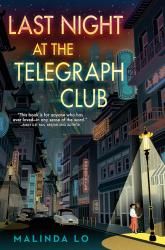
Last Night at the Telegraph club is set in the 1950's and follows Lily Hu a student in her final year of high school, and follows her life. During a dangerous time for Chinese Americans. It progresses slowly the struggles of Lily slowly begin adding up putting pressure on the characters, in multiple moments you can feel the pressure yourself, and feel the struggles. It confronts multiple stereotypes of the time this book it set women in stem, and the lesbian community. The characters in this book feel like their real, the characters have multiple layers to their personality. It immerses you in the story that you can perfectly picture and see yourself in the settings. The ending it leaves you wanting more, I would love to see a sequel of the following events that happened afterwards.
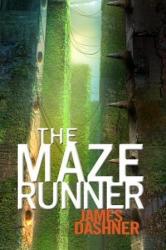
I started reading this book in 2012, just a few years before the movie was released. This book is a personal favorite of mine that I have read over and over again. This dystopian story follows a boy who was placed in the center of a maze with several other boys and follows his journey as he uncovers dark truths and attempts to escape the maze. Personally, I love the attention to detail in this book and how it keeps you on your seat throughout the story all the way to the end. In no way was this book predictable. When I first read this book I wasn't aware that it was of a series, so I was delighted to find out there were more books because of how great of a story it was. I would recommend this book to tweens and up since there is some mature material such as fighting and dying (it doesn't go into gory detail). Overall, this is a great read that I would personally highly recommend!
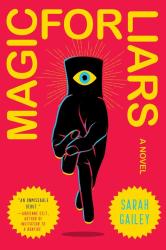
Ivy Gamble is a private detective who can't do magic. Her twin sister, who she hasn't spoken to in years, is magic. And Ivy Gamble definitely isn't bitter about this. When Ivy is hired to solve a horrific murder at The Osthorne Academy of Young Mages where her sister teaches, Ivy must face the losses in her past, the uncertainty of her future, and all the lies she's been telling herself.
Reading this book is like reading a short story. I mean that in the best possible way, in that the story is so tight and focused that it carries an emotional punch that usually comes best out of a short story. Some characters could be seen as one-sided, but for the most part every person in the book is given an opportunity to push beyond what they seem to be and surprise the audience in new and interesting ways. The two stars of the show would definitely be Ivy and her sister. Their relationship alone carries a depth and complexity I haven't seen in a while, and each on their own have a ton of layers to explore. I would also like to praise the worldbuilding of the book, mostly in that there isn't much of it. The book does enough to let us know what characters can and can't do, but it doesn't bother going to into a lot of unnecessary details. This is part of the reason the story is so tight and effective: the book trusts us all to have read books about magic schools, and doesn't bother trying to break the mold in a story that's about something completely different. I also like how the book is told through Ivy's point of view. It's well done in a lot of ways, mainly in the way it shows the twisty perceptions this book is about, and in how it shows Ivy herself. For example, Ivy spends much of the book obsessed with the fact that she could've been magic, but anyone reading can easily see that being a detective was the best path for her anyway. Its amazing how competent Ivy is, and how much that shines through despite her narration. I also like the plot twists this book does, how they're pretty predictable but are still so fun to watch unfold. The ending was surprisingly anticlimactic to me at first, but now I can see the way the book was trying to create a realistic ending, and let the audience hope for it to eventually be a happy one.
All in all, this was an amazing joyride of a book. I'd recommend it to anyone who loves magic, mysteries, complex characters, and stunning writing!
Reviewer Grade: 12
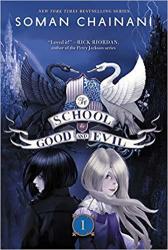
At first look, The School for Good & Evil may look like your classic and basic fantasy book with a little romance. Even though there is so much more, this book has so much depth to its plot, and just how the world is set up could be a whole book in itself. It starts in this little classic village that looks like any classic medieval village, maybe a bit more sophisticated. This village for the past 150 years has had two of their children aged around 16, boy or girl, taken from their village in the middle of the night and they are never seen again. The villagers try their hardest to stop this force that takes them, yet every year they fail. They go looking for them in the forest surrounding the village but every time someone has gone looking they go in on one side of the forest and appear out of the forest on the other side of the village. Then every year a book shows up full of stories, some including people who look like the children taken, the bookmaker then copies this book over and over to sell to everyone in the village. These stories are the classic fairy tales that everyone has heard of, as well as fairy tales we have never heard of. The village people have no clue where the children go or what happens to them except for the maybes in the books. Yet they know one thing, one child is good and one is evil.
The story starts with two girls, Sophie and Agatha, two best friends, yet opposites. Sophie is your classic-looking princess who has flawless skin, long golden blonde hair, beautiful clothes, almost the best house in the village, and is kind to everyone. While Agatha is your classic-looking witch who dresses in all black, doesn’t care about her appearance much, lives in a graveyard, has a cat that seemed to come from hell, and her mother is the witch doctor of the village. Both the same age, everyone knew they would be taken, knowing which is good and which is evil. Sophie wanted to leave desperately and did everything she possibly could to make sure she would be taken, Agatha wanted to stay in her quaint little life and not leave the village, her mom, and her cat. When the day came that the children would be taken everyone in the village worked to blockade every window door and make sure everyone stayed inside, while everyone older lined along the forest. Sophie prepared to be taken, and Agatha prepared to save her best friend from being taken. Night fell and as it turned out both Agatha and Sophie were taken, it was not a fun ride; they were pulled through the forest, the branches ripping their skin, then flying above in the claws of some bird. The two girls then saw the castles, the school for good and evil, one castle bright and shining and the other dark and gloomy. A fog came in and the girls couldn’t see anymore, they then were both dropped first Agatha and then Sophie. Yet Sophie woke up in the swamp of the evil castle and Agatha woke up in the shining clear blue lake of the good castle, something no one anticipated.
This book was something I never expected, I thought it would just be a bunch of fluff and would be a really short, easy, and bland read. NOT AT ALL. This book changed my expectations of how books should be written. This book was like something I have never read before. The twist on how we see fairytales is insane and shows what we never would have thought happened. There are so many twists and turns that even though you know the general idea of the book, you have no clue what is going to happen on every single page. This book would be great for anyone that loves reading fairy tales, fantasy, drama, and a little bit of a dark side twist in books.
Reviewer Grade: 12
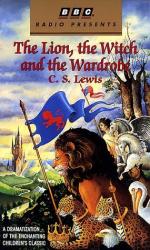
I first read this book when I was much younger and have read it many times since then, yet not in recent years. I just finished reading it once again about a month ago. Just like when I read the Lion, the Witch, and the Wardrobe for the very first time there was so much magic and wonder that engulfed me once more, and will again many times more.
It begins during the Blitz in 1940 with a family of four kids, Peter, Susan, Edmund, and Lucy. They, like many other children during this time, go to the countryside of England to escape the war and be safe. Yet their time in the countryside will be much different than any of the other children’s. They arrive at this mansion owned by a professor, who has a housekeeper that doesn’t want children there and makes sure that they don’t touch anything. The four children don’t want to leave their family and their home in London, but the homesickness fades away quickly once they start to have fun in the house and find a world of magic and endless possibilities. Lucy, the youngest of the four, finds a wardrobe hidden away in a spare room in the house, in it are a bunch of fur coats. She makes her way through with her eyes closed as the soft fur rubs against her cheeks when she suddenly feels something prickly and cold. She finds herself in a wood in the middle of winter and a faint light in the distance, the light coming from a singular light post in the middle of nowhere and nothing to power it. Here she meets Mr. Tumnus, a faun, who invites her for tea and cakes. She spends hours with him and learns about the land she is in, Narnia which is in a 100-year winter, and that she is the first human in this strange land in a long time, as well as that there is a witch, the White Witch, who has enslaved all of Narnia. When she returned she had been gone for hours, yet to her siblings, it was mere seconds, they didn’t believe her and when they went to check the wardrobe there was no wood. Edmund was especially mean about it but followed her in the middle of the night and found himself in the middle of the same forest she described and Edmund met the White Witch. One day all four children were rushed into the wardrobe as the housekeeper gave tours of the house since it had many relics, and they found themselves all in Narnia, not at all ready for the adventure ahead of them.
This magical place and book always make me feel like I was there with Peter, Susan, Edmund, and Lucy, as they had their adventures. The magic that C. S. Lewis was able to resonate with me every day as I too looked for a magical portal to a world unknown. This book is so enveloping as you read and finish it, it stays with you for years, making you think in ways you never thought of before. This book is an amazing book for anyone looking for an amazing fantasy book or a book that every time you read it you see something new.
Reviewer Grade: 12
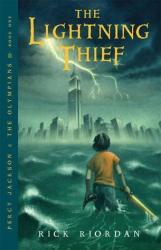
I have always loved Greek mythology, so when I found this book I knew I would love it. I was right I loved it, it was amazing. The Lightning Thief centers around a pre-teen named Percy Jackson, who lives in New York and has trouble in school. He has been in and out of many schools, almost a different one each year. At twelve years old Percy always felt like an outcast, like he fit in somewhere just not anywhere. He struggled with dyslexia and ADHD. Every year at school he has had some strange occurrence that ends up getting him kicked out. He has a best friend, Grover, and an amazing mother, Sally. He also has a stepfather that is abusive and he has pushed his mother to leave him but she won’t. There is a reason though for all of what Percy has gone through in his life. After encounters with many horrible and terrifying events and things in which most try to kill him, he and Grover end up at Camp Half-Blood. At camp he learns many new things, his best friend isn’t human but a centaur, his father is the God of the sea, Poseidon, and there is a prophecy that he is destined for great things. At camp Percy meets Annabeth, a girl that is a child of Athena the goddess of wisdom and warcraft, she is crazy smart and very resourceful, yet also seems to be an amazing friend and person altogether. As the three of them go on a quest to find Zeus's missing lightning bolt and return it to him. Percy, Grover, and Annabeth set out across the country for a quest of a lifetime, all at the age of 12/13. Percy and his friends face monsters and things they never could have imagined.
This book was honestly one of the best books I have read ever, and I have read a LOT of books. Although it is for a bit younger age group it is still an amazing read for anyone who is looking for a lighthearted and funny fantasy and adventure book, combined with Greek mythology and overall great writing and plot structure.
Reviewer Grade: 12
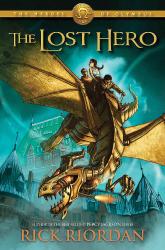
As a continuation of Percy Jackson and the Olympians series comes The Lost Hero. A novel continuing the world of Percy Jackson with all new faces and plots. Just like the original Percy Jackson series, I loved this first book of the Heroes of Olympus. The Lost Hero begins with Jason, a kid who can’t remember anything of his past waking up on a school bus with other students and two people talking to him. These two people are Piper and Leo, his apparent best friends and girlfriend. He doesn’t remember either of them at all. Even though they remember him and all the memories they shared. Piper is a kid from a famous father who does bad things to get his attention. Leo is the comedic relief of the group and makes everyone laugh, while also being a genius with mechanics. They are all in a school for delinquents and their actions sent them there. They are visiting the grand canyon when all of a sudden monsters attack causing everyone to panic. Jason starts to speak Latin randomly even though Piper and Leo had no clue he spoke it and never heard it, and Jason didn’t know that he could either. Jason also refers to the Gods with their roman names as the monsters talk to them. They are rescued by people from camp half blood and as expected there are some familiar faces. They get to camp and realize why they act the way they do and are eventually sorted into their cabins and Godly parents. They hear a prophecy and are instructed to save Hera and hear a new prophecy. They start on their quest and along the way, they learn more about each other and build a friendship from scratch again starting from the school bus. They encounter many new and different minor Gods and Goddesses as well as new creatures and people never seen before.
Just like Percy Jackson and the Olympians series, Rick Riordan can make new and exciting plots and characters. The amount of detail in this book was upped by a lot compared to his earlier works as they were much larger and could fit in much more story, allowing for a better and deeper story. I would suggest this book and the rest of Rick Riordan's books to anyone that loves Greek mythology, great writing, and as well as adventure, fantasy, comedy, friendship, mystery, and a little bit of romance all tied up into one great book.
Reviewer Grade: 12
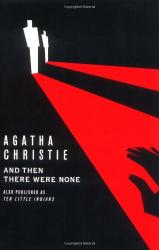
Ten strangers are mysteriously summoned to an isolated island... where murder awaits. Agatha Christie crafted an intricate web of betrayal and suspense, a must-read for any avid bookworm. This read was completely unpredictable - everyone was a suspect until the final, jaw-dropping reveal. The setup, the characters, and the gripping plot made this the best murder mystery I have read in years. With its trademark twists and a chilling ending, no one should miss out on the masterpiece of And Then There Were None.
Grade 11
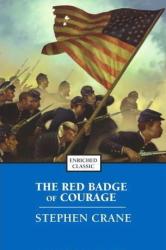
This book was a fascinating piece of literature. The author described war in more of a psychological format, as in the effect of war upon the mind, then a physical format. It reminded me of Robert A. Heinlein's Starship Troopers in its attention to the mind of a soldier. Many Civil War veterans would get a shock meeting Mr. Crane because they thought he had been in the Civil War when he hadn't. It was interesting how Crane referred to the main character, Henry Fleming, as "the youth". He uses similar naming for the other characters, like "the tall soldier," and "the friend." I enjoyed the book, and I'm impressed at how Crane, according to actual soldiers, so acutely described war on a minute-to-minute basis, when at the time of writing, he hadn't ever been in battle. This book almost felt like an experiment of Crane's, like he was just exploring new ideas. The result was international fame and a famous landmark of American fiction.
Reviewer Grade: 9
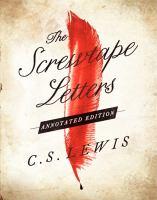
The Screwtape Letters by C.S. Lewis is a novel told in correspondence. Specifically, letters back and forth between a demon called Screwtape and his nephew Wormwood. These demons write to one another about all sorts of things, as families do, but mainly the humans. In this book, humans are the occupation of demons. Keeping them distracted, discontent, and leading them to misery is a merit of any accomplished demon. Readers will enjoy Wormwood's questions of "why must we do this?" or "is there a better way?" as he struggles with his mission to lead humans astray. Screwtape and Wormwood discuss many relevant issues of our own time, and the subject of spiritual warfare is present throughout. The Screwtape Letters is highly recommended for fans of Lewis as an introduction to more serious work or works on theology.
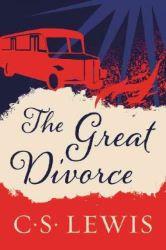
The Great Divorce by C.S. Lewis is a metaphysical novel following a bus tour through the afterlife. Strangers embark on wild journey through Heaven, Hell, and everything in between. As the story unfolds, characters realize every choice they make has a consequence, and their eternal destinies await them. Lewis speaks to universal experiences of grief, loneliness, and tragedy; his characters' stories are slowly told throughout the novel. Readers will enjoy the characters with varying backstories, explaining why they got on the bus tour. Follow humanity and hope unveiled in The Great Divorce. Next Stop: your bookshelf!
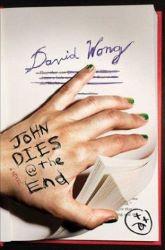
John Dies at the End is a story on two levels. On hand hand, it's a poignant exploration of the darkness of humanity, the fear of the unknown, the tragedies of life, and the devastating realities we exist besides everyday. But also, it's about two idiots on a space drug and their strangely resilient dog.
This book should be the blueprint for every dark comedy. It isn't a needlessly tragic story with a few laughs thrown in or a joke fest that undercuts every poignant moment. It blends comedy and tragedy seamlessly, balances it perfectly, and hits it for a home run with meticulous writing and characters. This is mostly done by finding the hilarity in tragedy, specifically the tragedy of life. This book is strangely and wonderfully existential for being mostly about shadows and movie monsters, a very classic demons of a character mirrored by demons of the world. The characters in general are stellar, with so many flaws and so much cynicism but with some shining nuggets of morality and love that makes them very easy to root for.
The entire thing is a joke that takes itself seriously in the best way possible. There are horrible moments of death and gore and dehumanization, and I would definitely look up some content warnings, but it's still such a fun ride. One minute there's gruesome character deaths and existential dread and body horror and such, the next minute one of the characters need to just kill the alien larvae quickly to get to work on time. Or their dog explodes and shows up like two days later and they don't care enough to investigate that. It's a rollercoaster of mood swings, but in a good way.
All in all, I don't know how to describe this book without using far too many words. Basically, despite some anticlimactic moments and weaker plot structure, this is a perfect dark comedy. I'd recommend this to any fans of horror, humor, existential dread, nihilistic humor, and well-written alien drugs!
Reviewer Grade: 12
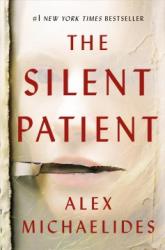
This eerie thriller was interesting, and I could have never guessed the plot twist! The Silent Patient follows a psychotherapist named Theo who is intrigued by patient Alicia's story of murdering her husband without warning or motive. She becomes mute and is resistant to talk about what happened that night, but Theo is determined to change that. Each chapter was engaging and added to the mystery of what led to the murder. Plus, the setting of a psychiatric hospital added to the grim and suspenseful tone of the book. By the very end, I was a bit confused by the plot twist because once it was revealed, it seemed like the characters totally changed personalities. Nevertheless, it was still a great book.
Grade 12
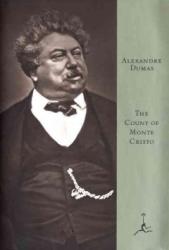
The Count of Monte Cristo serves as a literary masterpiece in both its prose and its raw images of humanity. Following Edmond Dantés on a journey of injustice, desperation, vengeance, success, readers are immersed in over a thousand pages of story about morality and the human experience. Through the chronicles of Dantés, his ruses, and his eventual persona, the Count of Monte Cristo, readers are able to explore France high society during the Napoleonic Wars, but also the injustices within the lower classes, and stories from everyday life of prisoners, laborers, and those outside of the elite. At its core, it's a book of adventure and romance, but the adventure is not without purpose. The manipulation, disappointment, and pure emotion are the driving forces of each character, and what makes the book such a special read.
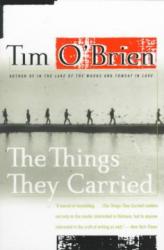
The Things They Carried is a modern necessity. A series of stories and reflections follow the journey of a hypothetical O'Brien and his squad as they 'hump' through the mountains and forests of Southeast Asia during the Vietnam War. The book plays with the ideas of reality and storytelling, and forces readers to construct a robust and complex understanding of the stories of war and the life after. At points, it becomes almost impossible to discern between reality and falsities, and the book itself is an intellectual journey. The stories tell the seemingly exciting and eventful moments of the war, but put a special emphasis on the trauma and shocking notes of the war. O'Brien contrasts each element with an essential counterpart: excitement with terror, nonfiction with fiction; storytelling with teaching. It's this contrasting of truths that makes The Things They Carried a staple on any bookshelf, and a read worthy of any audience.

Breasts and Eggs, lengthened from its original version, is a breakthrough piece for Mieko Kawakami, but also for the literary world. Her masterful prose is able to capture the attention of any reader, and draw anyone into the worlds she creates. The book is centered around a family of low-income Japanese women, battling their way through life and facing poverty, the image of their bodies, each other, and their desires for the future. Each conversation is written as if it's taking place in the readers' living room, and each sense is captured on every page. Kawakami works through seemingly every contemporary issue effortlessly, putting each piece into place within the story, instead of unnaturally breaking the flow of her storytelling She plays with issues of fertility through a character whose journey should, on paper, be shocking and different than anything readers have seen, but does it in a way that makes it feel real and beyond possible. The book is so fantastic that it could be read in a day if readers can't make themselves put it down, but it would be a rollercoaster of a day.
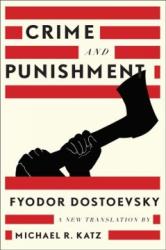
Crime and Punishment is a novel like no other. Set in Russia in the mid-1800s, Crime and Punishment watches the mental anguish suffered by a poor man forced to turn to murder in order to survive. The work has been cemented as one of the greatest pieces of psychological writing of all time and for good reason. Raskolnikov is a deeply tortured protagonist, and Dostoevsky brutally captures his emotions, fears, and motivations throughout the novel. As other characters with conflicting motivations threaten Raskolnikov's plans and schemes, his stress only becomes more powerful.
Crime and Punishment is not an easy novel by any means. The writing style is fairly archaic, and conversations can run on for what feels like forever. However, the story is so well thought out and executed that it deserves a read from anyone interested in psychology, literature, or even acting (the story serves as an excellent example of a character study from which one can take notes). Do not expect light reading or a feel-good story, as this book will take the reader into the desperation and pain experienced by the protagonist.
Crime and Punishment is one of the best novels of all time, and although it is a challenge to read, it is absolutely worth it for its views on society and man's mental state. If this review has sounded interesting to you, do yourself a favor and check it out today.
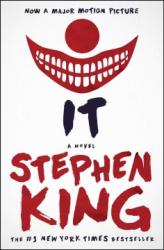
Despite the high page count, I've been looking to reread It by Stephen King for some time. It was a great book; it just took some time to get through. Seven friends all team up to fight an other-worldly murderous clown after several people turn up dead in the small town of Derry. This clown feasts on your worst thoughts and fears, and destroys your mind as well as your body. The switch between the seven friends as kids versus adults was entertaining, because they handled emergency situations differently as well as having different motives because of how the clown affected their childhoods. The chapters could get tedious at times and have a lot of fluff (in a horror book? YES!). I would even call the last hundred or so pages strange as the final battle became sort of biblical and unlike the direction of the rest of the book. Still, if you're a fast reader and would like to get a horror book under your belt, try it out!
Grade 12
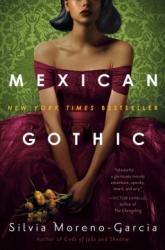
Mexican Gothic follows an interesting take on haunted houses and distant ancestry. The resilient main character, Noemi, travels to a small town to visit her newly-married cousin at a house called High Place out of concern for her cousin's illness. The longer she stays, though, the more she realizes that there is something more sinister going on than an isolated family. Unlike some reviews I saw, the pacing was engaging for me. It was broken into short chapters with a lot of action in the last hundred or so pages, which is how a lot of thrillers are organized. This helped me be motivated to read more when the story line was not quite my taste. It was cool, however, that Noemi was realistic in her thoughts and reactions. It made the story feel more genuine as the plot got crazier. This isn't something I would necessarily recommend, but it was still enjoyable.
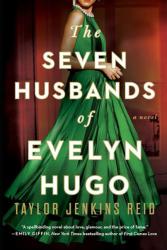
It is a deal breaker for me when a book's main character is unlikeable. This book was not like that. Evelyn is a talented and determined character who was able to break away from her traumatic experiences and pave the way for female actresses that don't match Hollywood's cookie cutter movie stars. She isn't always polite and malleable, which was cool to see when other books set in the same time period only focus on men's perspectives. I was invested in Evelyn's life throughout the progression of her seven marriages and how they ended. Monique is a scatter-brained but relatable character as well. I enjoyed how she and Evelyn interacted and the twist of how their stories intertwined. Try this book if you like historical fiction and being uplifted by female empowerment.



 Ruth Holley Library will be temporarily closed for approximately one week starting Mon., Dec. 2 to complete roof repairs.
Ruth Holley Library will be temporarily closed for approximately one week starting Mon., Dec. 2 to complete roof repairs.